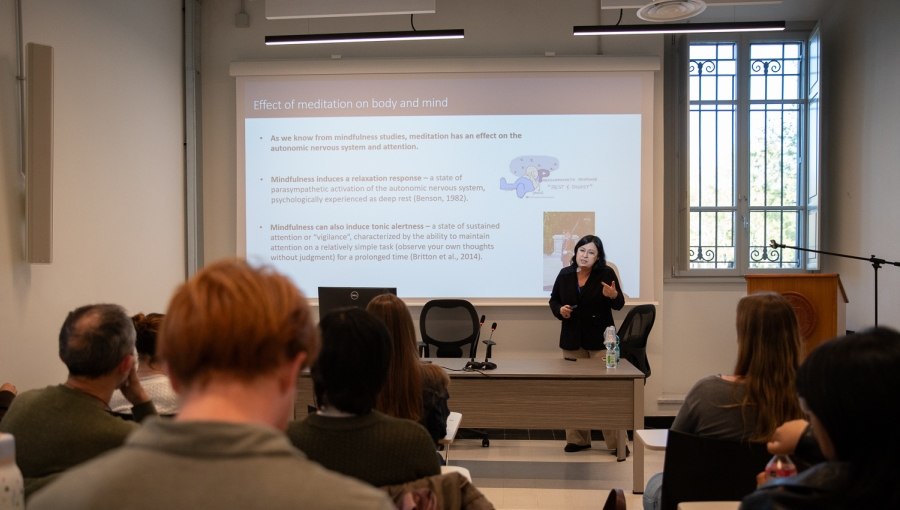Transhumanism and Africa: JCU Hosts Online Symposium
On February 26, John Cabot University philosophy professor Stefan Lorenz Sorgner and Professor Leo Igwe of the University of Cape Town co-hosted an online symposium called “Transhumanism and Africa.” Transhumanism is the belief that science and technology can be used to transcend humanity’s physical and mental limitations. The discussion saw the participation of Leo Igwe, Martine Rothblatt, Thomas De Frantz, Aubrey de Grey, Agbolade Omowole, Chogwu Abdul, and Bernd Kleine-Gunk. All participants are experts in their respective fields, and each has a unique perspective on transhumanism in Africa.
Professor Sorgner began by contextualizing transhumanist thought on the African continent and giving a brief synopsis on past achievements, particularly in relation to the increase in life expectancy and poverty reduction in the past 200 years.
Professor Thomas de Frantz of Duke University spoke on the topics of afro-pessimism and Afrofuturism. Afro-pessimism is a framework that describes the effects of racism, colonialism, and historical practices of enslavement on the realities of African Americans today. Afrofuturism is the movement in literature, music, and art attributed to futuristic themes of black history and culture. Professor de Frantz specializes in African diaspora aesthetics, dance historiography, and the intersections of dance and technology. He is a contributor to the permanent installation on black social dance at the Smithsonian National Museum of African American History and Culture. His views on the relationship between transhumanism and ritual expression sparked a discussion on African identity in a post-transhumanistic world, and on how identities of blackness and whiteness would change to celebrate human differences.
In January 2022, Dr. Martine Rothblatt made headlines for leading the team that transplanted the first genetically modified heart from a pig to a human. Dr. Rothblatt is CEO of the United Therapeutics Corporation, a company that produces life-extending technologies and is advancing the development of manufactured organs. Her presentation largely focused on the work of Dr. Sian Proctor, a geoscientist, explorer, and artist who is one of the world’s most renowned Afrofuturists and the first black woman to pilot a spacecraft. Through poetry published by Proctor, Rothblatt illustrated the importance of justice, equitability, diversity, and inclusion (JEDI) in any transhumanist endeavor. Rothblatt also developed the idea of “transhumance,” how humans will begin a mass migration in the coming century in search of a better life. A discussion followed about the practical aspects of transhumanism in the context of Africa and the benefits of Elon Musk’s Starlink (satellite internet) on the continent.
Next, Aubrey de Grey, a biomedical gerontologist who researches mammalian aging and designs for intervention, took the floor. His research is often cited by transhumanists because it focuses on how technological progress can help maximize the benefits to the human condition. De Grey, as an engineer and self-described “techno-visionary,” addressed the topic of transhumanism in Africa from a more pragmatic angle rather than a theoretical one. He elaborated on what Rothblatt touched on earlier regarding the importance of diversity in both transhumanist thought and on overall scientific and technological advancement, saying that “diversity of upbringing and ways of thinking is the main ingredient that helps to solve and minimize the damage done by conventional wisdom.” The African continent offers a unique point of view that could be instrumental in ending the aging process, according to de Grey. He continued by arguing that the real bottleneck in the field of longevity has shifted from a lack of funds to a lack of talent, and therefore Africa could play a massive role in clearing this bottleneck and advancing the field.
Lastly, Leo Igwe, professor at the University of Cape Town and leading human rights advocate spoke on the topic of transhumanism from a uniquely African perspective. He focused on how Western anthropologists and popular culture have incorrectly portrayed Africa through the lens of colonialism and exaggerated exoticism. It creates a harmful “us” versus “them” dynamic that stymies growth and prosperity both in Africa and in the West. He stressed the importance of evaluating Africa on the same analytical plane as other regions. Touching on the points made by Professor de Frantz, Professor Igwe considered the possibility of transhumanism leading to the end of the racial designation of human beings. While acknowledging how new technologies can often stoke fear and anxiety, he concluded by arguing that emerging technologies have the potential to reshape the African continent for the better.
The discussion provided a perfect medium for leaders in the field of transhumanism to explore different viewpoints and reach a consensus on transhumanism in the African continent. From theoretical and philosophical debates to pragmatic approaches both past and present, the symposium presented viewers with a vision of transhumanism that stresses inclusivity, representation, and its relationship with the peoples and diverse cultures of the African continent.
Watch the recording of the “Transhumanism and Africa” symposium.





